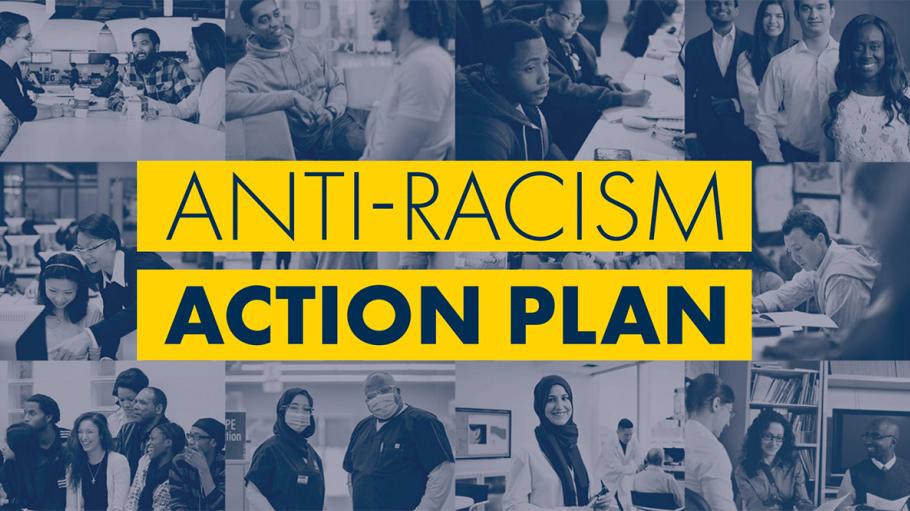The two-year Anti-Racism Action Plan is a dynamic guide, combining reflection, education, action and accountability measures to eradicate racism in all its forms at GBC, and is aligned with the college's strategic goals, as outlined in Vision 2030 and Strategy 2026.
The Anti-Racism Action Plan contains three sections:
- Key Strategic Recommendations (KSR) to strengthen our foundations for success in anti-racism, equity, indigenization, reconciliation and inclusion. The recommendations came from the George Brown College community.
- Two-Year Strategic Action Plan provides the framework for the college to take actionable steps to combat racism.
- Driving for Change outlines additional actions and strategies for GBC past the timeframe of the two-year action plan.
With two key objectives:
- Learning by building anti-racism awareness (year one)
- Looking by assessing the work through an anti-racism lens and identifying gaps (year two)
Significant strides have been made in the Learning phase with the leadership of the Office of Anti-Racism, Equity, and Human Rights Services (OAREHRS). Addressing racism depends on individuals leading change while also taking part in collective action. OAREHRS continues to collaborate with departments across the college, delivering essential tools through online learning modules, toolkits, consultation and events. Efforts are also underway to embed anti-racism frameworks into curricula and hiring practices and policies, marking important progress towards our shared vision of a more equitable and inclusive George Brown College.

Anti-Racism Action Plan
Launched in March 2022, the Anti-Racism Action Plan is a collaborative effort stemming from the dedication of the Office of Anti-Racism, Equity, and Human Rights Services (OAREHRS), the Anti-Racism and Equity Advisory Committee, the Anti-Racism Strategy Review Task Force, GBC's senior leadership team, and employees and students who contributed valuable feedback and consultation.

1. Key Strategic Recommendations Progress
We have taken meaningful action on and completed half of the eight key strategic recommendations (KSR). They include:
Actions taken
- KSR 1 Elevate Anti-Racism, Decolonization and Equity in Strategy 2026, Vision 2030—IMPLEMENTED
Equity, reconciliation, and belonging are prioritized equally among other organizational imperatives as Priority 5 in the college's strategic goals. - KSR 2 Establish Dedicated Resources for Anti-Racism and Equity Efforts—IMPLEMENTED
Financial resources have been allocated to specifically support anti-racism and equity initiatives. This includes two additional full-time employees for OAREHRS dedicated anti-racism and equity functions; two full-time employees for Black Futures; incremental budget increases; space allocation; and new positions dedicated to supporting the integration of Indigenous pedagogies and curriculum development.
- KSR 4 Review the structure and resourcing of the Office of Anti-Racism, Equity and Human Rights Services (OAREHRS) and Indigenous Education Services (IES), now Indigenous Initiatives, departments—INITIATED
The OAREHRS reviewed recommendations for internal structure redesign provided by an external consultant and began implementing those recommendations in 2023. The recommendations include dedicated resources for institutional education, awareness and prevention activities. - KSR 5 Develop a college-wide strategy for robust demographic data collection—INITIATED
Using data accelerates anti-racism and equity efforts. GBC has begun implementing processes to enable the collection and analysis of data that includes disaggregated data related to intersecting identities, such as race, ethnicity, and gender identity. The OAREHRS initiated self-identification programs for Indigenous and racialized students in 2022 and administered the Employment Equity Census in 2023. This will advance the college's ability to measure, map, maintain, and share information about the pervasiveness of systemic inequities/discrimination within our institution to support evidence-based decision-making.
2. Action Plan Progress (Year 1)
The actions outlined in the plan fall into five focus areas: Commitment, Culture and Climate, Capacity and Capabilities, Curriculum, and Community. We've made substantial progress on this ambitious plan that includes 30 action items in the first year (2022/23).
Read all actions outlined in the plan.
Here's what we've completed so far:
Objective: To enhance leadership capabilities by establishing baseline anti-racism and equity development requirements, ensuring the uptake of ongoing resources and tools to develop racially responsive and equity-minded leaders.
- Members of the senior leadership team and the Board of Governors will complete the Leading for Equity learning series delivered by an external consultant. (1.1)
- Develop and disseminate anti-racism and equity education and toolkit designed specifically for leadership at all levels to deepen understanding and awareness and provide tools and resources to support behavioural change. (1.2)
- Review department/division anti-racism and equity priorities (including those identified in this plan) and develop annual divisional work plans, recording plans in Envisio and updating plans in accordance with operational planning guidelines. Report progress of plans to the OAREHRS annually. (1.3)
Ensure college accountability to anti-racism and equity efforts by requiring annual reports and supporting and resourcing efforts to realize the actions set out in this document. (1.4)
Objective: To increase the presence of inclusive spaces and symbolic and visual representation of our diverse community within the physical environment and improve shared perceptions of racialized employees and students.
- Explore opportunities to create designated spaces and opportunities at GBC for Black, Indigenous, and other racialized students and employees to gather, host events, celebrate and share traditions and achievements to foster belonging. (2.1)
- The OAREHRS and Black Futures worked with Facilities to secure designated spaces at the St. James Campus, 200 King St. E. that includes the OAREHRS space on the second floor, 264D, and the Black Futures office on the fifth floor, 581C, set to open in February 2024.
- Black Student Success Network (BSSN) opened dedicated space at St. James Campus, 200 King St. E., on the lower level in room B130 in Fall 2023
- Develop internal and external communication plans to promote key messages in support of public education and to build awareness of GBC's anti-racism and equity efforts. (2.4)
Objective: To enhance the GBC community's understanding of and alignment to equity and inclusive excellence as an institutional imperative and to improve campus-wide anti-racism, anti-Black racism and equity skills and capabilities.
- Revise the Introduction to Anti-Racism training and develop a self-directed asynchronous learning module for mandatory employee training. (3.1)
- OAREHRS developed Doing the Work: An Introduction to Anti-Racism.
- Require all employees to take the Introduction to Anti-Racism self-directed module within the first year of implementation. (3.2)
- As of October 2023, 70 per cent of employees have completed the module.
- Periodically, make available to all employees and students a series of anti-racism and equity-focused workshops and facilitated sessions on relevant topics, including power, privilege and bias, anti-Black racism, decolonization practices, engaging in difficult conversations and becoming a racially responsible and equity-minded leader/faculty/student. (3.3)
- Develop a learning resource guide and toolkit to support leaders and employees in developing anti-racism awareness and skills, with the aim of fostering an attitudinal shift to inform anti-racism practice within the classroom and broader working environment. (3.4)
- Develop and implement department work plans identifying anti-racism and equity-related training and learning targets, as well as anti-racism and equity actions (inclusive of all related actions in this plan). (3.5)
- Require all employees to identify individual anti-racism and equity-related priorities as part of the 2022 priority setting. (3.6)
- Implement a mandatory anti-racism and equity self-directed learning module for students to complete at orientation or admission. (3.7)
Objective: To support the development of racially responsive and equity-minded faculty to enable integration of anti-racism, equity and decolonizing principles into instructional, curriculum and research approaches and practices.
- Develop and embed faculty-focused anti-racism and equity tools and resources to enhance the GBC Faculty Onboarding Academy. (4.1)
- Require all faculty to engage with a develop a plan to implement the actions in the Indigenous Education Strategy. (4.2)
- Create a repository or portal (microsite) to facilitate access to tools and resources that encourage and support faculty in implementing anti-racist and equity-minded and inclusive course design, teaching practice and assessments. (4.3)
Objective: To develop equitable human resources capabilities and philosophies to support the development of college-wide inclusive practices to attract and hire talent that is reflective of the racial diversity in our broader community, within all departments and at all levels.
- Provide anti-bias training, tools and resources to the Talent and Acquisition team and hiring managers to support more equitable hiring practices. (5.1)
- Include in all onboarding letters to new staff and faculty the requirement to complete Introduction to Anti-Racism, Human Rights and Sexual Violence Prevention training. (5.2)
Review the Employment Equity Census process to support the ongoing collection of EDI (equity, diversity and inclusion) data and enhance the collection of disaggregated race-based data. (5.6)
3. Driving for Change
The third section of the Anti-Racism Action Plan aims to foresee the future of anti-racism work at George Brown with investments in place, internal and external partnerships, and the continual ability to shift and grow. The actions identified (reflected in the KSRs, noted above) require greater investment, deeper commitments, and greater collective skills and knowledge of anti-racism and equity practices.
Read Actions Beyond 2024 in the Anti-Racism Action Plan (page 22).
In 2022/23, OAREHRS engaged in dialogue and planning with departments across the college to support the actions outlined in the Actions Beyond 2024 section of the Anti-Racism Action Plan. OAREHRS worked with the following areas closely in the past year:
- Black Student Success Network (BSSN)
- Centre for Arts, Design and Information Technology
- Indigenous Initiatives
- Office of Academic Excellence
- Research and Innovation
- Talent Acquisition
- TLX (Teaching and Learning Exchange)
There are many areas of the college working without fanfare, creating incremental positive changes and dynamic impact. Stay tuned for updates on this work.
- Enhancing curriculum development and teaching practices
- Talent and Acquisition, Inclusive Hiring
- CADIT/Black Futures Design Jam
Enhancing curriculum development and teaching practices
OAREHRS, TLX, OAE and Indigenous Initiatives working group
The OAREHRS, Teaching and Learning Exchange (TLX), the Office of Academic Excellence (OAE) and Indigenous Initiatives have been working together to build capacity within the team and co-designing plans and goals to support anti-racism and equity, diversity and inclusion implementation throughout curriculum development and teaching practices.
Inclusive Hiring Resource Development
The OAREHRS and the Talent and Acquisition department continue working collaboratively to develop an inclusive recruitment and hiring toolkit and program. An inclusive hiring panel program was piloted in Winter 2023, which included inclusive hiring tools and a three-session anti-bias program for all panel members involved in an academic cohort hiring initiative.
CADIT/Black Futures Design Jam
In March 2023, the OAREHRS, the Centre for Arts, Design and Information Technology (CADIT), and Black Futures Do Tank invited Black students, employees, community members and their allies to engage in a collaborative process to generate ideas for moving systems and institutions towards creating Healthy Black Futures. The full-day event provided recommendations to support the development of Black Futures at GBC.
Anti-Racism Action Plan Deliverables, 2022/23
As part of the Anti-Racism Action Plan, the OAREHRS outlined specific deliverables to be achieved between 2022 and 2023 to create a presence of anti-racism work at the college. As of October 2023, we have achieved the following:
Internal communications plan and social media
Achievements
- Social media: @oarehrs_gbc on Instagram (more than 900 followers and more than 85 posts)
- Partnered with the communications department for institutional messaging on significant dates
Leadership development, learning guide + toolkit
Achievements
- Anti-Racism Leadership Starter Toolkit
- Leading for Equity Learning series (two parts for senior leaders)
- Take 5 for Anti-Racism tool and initiative
- Anti-Racism Primer
- Doing the Work: Introduction to Anti-Racism e-course
Anti-Racism 101 learning module (staff version)
Achievements
- Doing the Work: Introduction to Anti-Racism self-directed e-course (mandatory staff training). As of October 2023, 70 per cent of employees had completed the learning module.
Anti-Racism 101 learning module (student version)
Achievements
- Doing the Work: Introduction to Anti-Racism e-course (student version)
Microsite for anti-racism, anti-Black racism, EDI resources
Achievements
Anti-racism + equity decision-making, policy review guidelines
Achievements
- Anti-Racism and Equity Program and Policy Review Pilot
- 40+ team and individual consultations
Workshops, events, and facilitated dialogues
Achievements
Workshop offerings (titles):
- Trauma-informed Approaches (five-part development series)
- Cultivating Anti-Racist Sensitivity Group Facilitation
- UDL as a Conduit for Anti-Racism Workshop - HEQCO Town Hall
- The Implications of Anti-Racism Workshop
- Anti-Asian Racism workshop series (2)
- Healing circle series (2) for Black students impacted by anti-Black violence globally.
- The Implications of Anti-Black Racism Workshop (classroom presentation to eradicate racism in the classroom)
- Human Rights 101 education
- Black Futures Month events/activities (16), 2022/23
Anti-racism activities beyond committed deliverables
Achievements
- Development of Anti-Racism and Equity Advisory Committee, TOR, onboarding.
- Development of Black Futures "Do Tank"
- Black Futures Jam
- Signatory of the Scarborough Charter (Eliminating anti-Black racism in post-secondary institutions).
- Student self-identification implementation: Race-based data collection.
- Take 5 for Anti-Racism initiative, implemented by all administrators.
- Hired Black Futures co-ordinator (one-year secondment) to lead initial research and develop proposal for future considerations for Black Futures funding.
- Allocation of funds and approval for Black Futures secondment, future Black Futures director and co-ordinator for the institutional program.
- Hired education and awareness co-ordinator to develop an innovative anti-racism education.
- Enhanced student scholarships for racialized and international students (Sociability Award).
- Developed student-led Say My Name campaign (headed by OAREHRS placement student Raymund Hip Loy Lee.
- Supported Human Rights and EDI capacity building of Black Student Success Network (BSSN) student ambassadors.
- Established a partnership with Onyx Initiative, which provides Black students with support through mentorship to enter roles in corporate Canada.
- OAREHRS partnered with TLX to develop new faculty anti-racism onboarding training.
- Employment resources made specifically for Black, 2SLGBTQ and students with disabilities, developed in partnership with the Career Planning and Development team.
- Academic Excellence: Anti-racism coaching for discussion on anti-racism curriculum.
- Associates from TLX are currently developing the Anti-Racism Capacity Building series (Centre for Preparatory and Liberal Studies).
- Tender Tough Talk: Rapid De-escalation Skills for Public Educators, delivered by an external consultant.
- Developed Equity Census Working Group.
Next steps
The OAREHRS will continue to work toward cultivating an intentional commitment to anti-racism and equity at George Brown College. Initiatives that will become more prominent in the next year (2023/24) will include:
- Development of Black Futures as an institutional program aimed at impacting the lives of Black students, employees, and allies in positive ways.
- Strengthening internal and external partnerships to build capacity to provide services, resources, tools, and supports that meet the needs of racialized employees and students at GBC.
The OAREHRS will also focus on greater education while expanding efforts in areas that intersect with anti-racism work, which include, but are not limited to, the following:
- Accessibility
- 2SLGBTQIA+ communities' needs
- Conversations around mental health, care, and support for racialized peoples.
The OAREHRS will continue efforts to expand data collection activities as a priority to explore how race-based data can provide insight and support qualitative findings to help impact the development of new policies, supports, or programs. Additionally, more learnings will be available to the GBC community that take a deeper look at racism and the ways in which we can foster good conversations that allow us to grow and do anti-racism work in ways that do not cause harm or isolation for students and employees.

Thank you!
It is important to emphasize that advancing anti-racism within our institution is a collective endeavour. At GBC, we are committed to fostering a more equitable and just community, and this transformation requires the active involvement of every member of our college. The OAREHRS sincerely appreciates the dedication and support of the many allies, accomplices, and champions who have joined us in this crucial work.
As we look ahead to the coming year, the office remains dedicated to identifying and nurturing new champions who will promote and engage in activities that advance anti-racism at GBC.
We extend our gratitude to everyone who continuously strives for higher standards of anti-racism and equity in their day-to-day practices and interactions and to those who have contributed to creating a better environment for Black, Indigenous and racialized community members. Your efforts not only positively shape our institution but also help us fulfill our commitments to cultivating a culture of equity and belonging for all members of our community.

